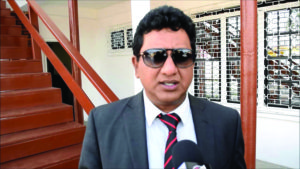The Broadcast (Amendment) Bill has been passed in the National Assembly, but former Attorney General Anil Nandlall is asserting that the Government is yet to deal with broadcasters’ concerns. This includes the impact the Bill, if enforced, would have on a number of rights, including property rights.

According to Nandlall, the one-hour imposition on broadcasters to carry Public Service Announcements (PSA’s) free of charge has an impact on property rights of the broadcasters. He noted that since these media outfits are in the business of selling airtime, this free one-hour imposition amounts to expropriation of their money.
“It is trite law that property includes money. So this free one-hour imposition by the State will amount to compulsory acquisition of private property without compensation and therefore, violates Article 142 of the Constitution.”
“Some media operators estimate their loss will be nearly G$1 million per month as they sell one-hour airtime for G$30,000,” he said.
He noted that there are other facets of the Bill which render it “draconian, oppressive and resultantly unconstitutional.”
“For example, the regime of new fees, unlike what the Prime Minister says, would cost broadcasters much more as they now have to pay, not only a fixed fee, but a fee for every zone in which they will be licenced to broadcast.”
“So, a radio station with which I am familiar now pays an annual fee of G$2.5 million to broadcast. When the Amendment comes into force, and if that radio station is licensed to broadcast to the same spectrum reach which it now enjoys, its fees will be increased to nearly G$8 million, annually, because of the zoning system which the amendment imposes.”
He stated that the Constitution should not allow such conditions to be imposed upon broadcasters, who are guaranteed fundamental rights and freedoms by it.
“The Constitution would regard these conditionalities as undue fetters which would make the true enjoyment of the civil liberties it guarantees, as illusory. They will be struck down as unconstitutional. I believe that I have provided sufficient grounds for the Government to proffer some answers.”
In addition, Nandlall criticised the Prime Minister, who championed the Bill, for glossing over the more troublesome aspects of the Bill.
Part two of the Bill sets out that broadcast agencies will be mandated to broadcast public service programmes for a total of up to one hour daily. Broadcast agencies will be airing these public service programmes free of cost and as requested by the Government between 06:00h and 22:00h.
The Bill also states that the Guyana National Broadcasting Authority (GNBA) reserves the right to direct a broadcaster to broadcast emergency notices for any length of time. This can even be done during peak or prime advertising time. A broadcaster will have the right to file a complaint with the GNBA within 24 hours of being asked to broadcast a programme free of cost if, in the agency’s judgment, it is not considered a public service broadcast programme.
But there is a warning for broadcasters daring to oppose the legislation: the Bill states that any broadcaster the GNBA finds to have “arbitrarily refused” to broadcast a public service broadcast programme without lodging a complaint has committed an offence.
Even before its passage, broadcasters have already come out in opposition to the new proposed measures. Using its seat majority, however, the Government had forged ahead with its passage over the opposition from the other side of the House.



